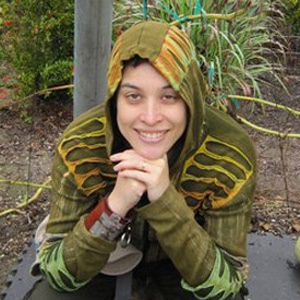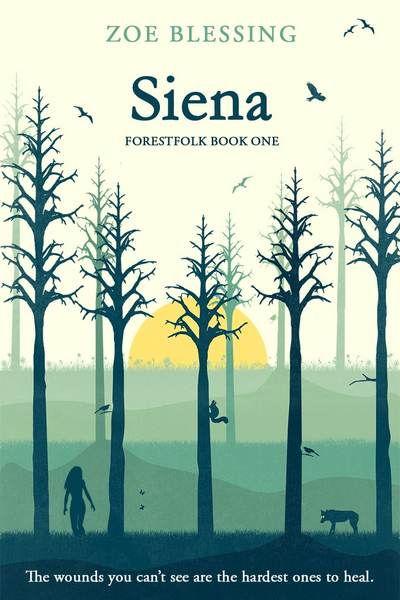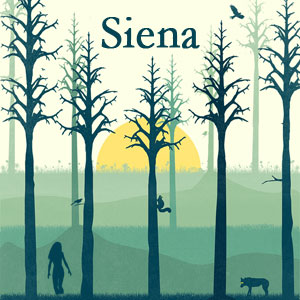It wasn’t until the following day that I discovered what the battle was even about. I was heading toward the river to refill my water pot. A guard trailed at a distance behind me, as one always did, to ensure their precious commodity didn’t run away.
The compound sat on higher ground, some distance away from the slow-moving river. It was a cluster of structures, some temporary like tents, and some permanent like mud huts, surrounded by a wooden fence. This fence, comprised of roughly hewn wooden poles planted into the ground about two hand-widths apart, made it easier to protect the perimeter against animals and invaders. Mostly other tribes. Nearly all the Plainsmen lived in tribal compounds like this. My mother used to tell me stories of nomadic tribes who lived in harmony with nature, moving to various locations to follow food sources or weather patterns. It made me wonder what happened to them.
From the break in the perimeter, I shaded my eyes and followed its meandering line across the plain. The sun glinted off its surface like a sparkling snake slithering through the grasslands. The plains stretched all the way to the horizon in some places, dotted only by an occasional shade tree.
As I proceeded to the river, another man fell into step with the guard behind me, his footsteps heavy. “Guard duty again?” His voice was deep and gruff, which I recognized as belonging to Grash. “Are you really that useless and soft?”
The guard attempted a manly scoff, though at sixteen, he was barely older than I was. “I do more around here than you so-called warriors. Who attacked us, anyway?”
“It was those flea-infested Krat. I’m recommending to Chief Magar that we counter-attack at once. While they’re still wounded. Make them think twice about challenging the Zurbo tribe.”
“Why would they attack us?”
“Who cares?” Grash spat. “By the time we’re done with them, they won’t know why they attacked us either.”
“I heard they have a new chieftain, and he’s killing all Aberrations. You think that’s why they attacked us? Because we have some living with us?”
My stomach dropped. Aberrations. Like me. I turned around to look at them and was immediately met with a glare from Grash.
“Do you forget your place, girl?” he snarled.
I immediately whipped my head around and fastened my gaze on the ground, my straw-colored hair hiding my frown.
“If it were up to me,” Grash said, projecting his voice to make sure I heard him. “I’d kill them all. Unnatural and treacherous, all of them. But Chief Magar insists they have use, so we keep them alive.”
“I guess,” said the young guard. “But . . . it wouldn’t be so bad to be like Stobon, right? I mean, he never misses a target, ever.”
“Listen, boy,” Grash rasped. Feet scuffled, and with a stolen glance I saw he had grabbed the young guard’s arm. “If I was an Aberration, I’d kill myself! Chief Magar may tolerate the useful ones, but we both agree they can’t be trusted.”
I gritted my teeth. As far as I was concerned, Grash and Chief Magar could both suck a toad.
I reached the river’s edge, grateful to give my jittery hands something to do. If there was one person who made my skin crawl on a regular basis, it was Grash.
He wandered away, probably to go ogle some women bathing in the river, and I rinsed out my clay pot. Child-like war cries sounded in the distance. I watched Pimo, my nine-year-old half brother, running after his friends along the shore, waving a stick overhead like an axe. He ran anywhere he pleased because he was the son of a Plainsman, and also not an Aberration. We shared a mother, but that was about all we had in common.
When he reached me, he stood at the water’s edge, stance wide like a small warrior squaring off. His little friends gathered around where I crouched in the water, filling my pot. I sighed. Not again.
He pointed his stick at me. “Your eyes are weird because you’re evil inside, and it’s seeping out.”
“Evil is blue?” one of his friends asked.
“Shut up! You don’t know anything.” Pimo turned back to me. “Aberrations stink like boar poop.”
His friends all laughed.
Encouraged, he began singing, “Aberrations are boar poop! Siena smells like boar poop!”
His friends joined in, and I gripped the pot until my fingers ached. It didn’t matter how much I wanted to dunk every one of them into the water, I wasn’t allowed to touch them. Not unless they needed healing.
I began fantasizing about beating them to a breath away from death, and then healing them afterward, only to beat them again.
“Who knew vermin had such beautiful singing voices?” someone said.
“Meresh!” The singing stopped and the children crowded around the chieftain’s son.
“I have a task for the most useful one here,” he said. “Which of you is that?”
“I am!” they all chimed at once.
“All of you, huh? Okay, let’s have a contest. I want to see who can bring me the most reeds. Don’t pick the scrawny ones! They have to be thick enough to make baskets. Understood? Okay, go!”
The boys scattered and began shoving each other as they ran.
“Saved you again, didn’t I?” Meresh approached me and I stood, knee-deep in water. Of all the Plainsmen in this tribe, he was by far the nicest. Even if he was a little full of himself.
“Thank you, Meresh.” I looked down at the water as it swirled past my shins, unsure what else to say.
“Here, let me take that.” He waded in and hoisted the water pot into his sturdy arms.
“There’s no need. I can—”
“I know. I just want to.”
As we walked back to my hut, I wondered aloud, “Why?”
“Why what?”
“Why are you nice to me? You know I’m an Aberration, right?”
He laughed easily. “Maybe some are dangerous, but I’ve seen you. You don’t even swat flies. I don’t think you’d harm anyone.”
“So you talk to me because you know you can take me in a fight, is that it?” I wondered what he’d think if he could have seen the inside of my head a few moments ago.
He raised an eyebrow at me and puffed out his chest a little. “I can take a lot of people in a fight. But I talk to you because I like you.”
“Won’t your father be angry?”
His lips twisted and he shifted the water pot in his arms. “Maybe. But I’m a man now. I do what I want.”
Two brown-haired women who had been talking and heading toward the river abruptly altered course, walking a wide circle around us and shaking their heads, while muttering things to each other. I noticed his eyes following them uneasily.
“You’re my age. Are you sure about that?” I took the pot from his arms. “Thanks for your help. I’ll take it from here.”
He gave me a tight smile and nodded his farewell before loping off in another direction.
I had just set the pot down inside my hut when Shandy loomed in the doorway, his great shaggy head swiveling around until he saw me. He staggered in, limping, and fell into a nearby chair. I was surprised it held together.
“I have an injury, girl!” He was completely unaware how loud he was. The stench of ale filled the room.
I sighed—inwardly, because any sign of non-compliance is a punishable offense—and trudged to the large man. His feet were filthy and bare, and one of them had a large bloody hole in it. I didn’t bother wondering what happened to him. Shandy was no stranger to drunken stumbling. I imagined he probably staggered around the grounds until he stepped on a wooden spike or tree branch. It probably took him a full minute to even notice it. But he was well liked because everyone admired his intimidating size. It was one of the most valued traits in a Zurbo tribesman.
I placed my hands around the injury and concentrated. My energy flowed into the wound, and it soon closed up. He peered over his belly at the foot and smiled. One of his teeth was missing.
“You’re a good kid,” he said gruffly and patted my head with more force than I think he intended, jarring my skull against my neck. Then he pushed himself up from the chair and clomped out without another word.
This was my life. My sole purpose in this tribe. They got injured, and I healed them. I suppose it could be worse.
I could be dead.












Comments (8)
See all